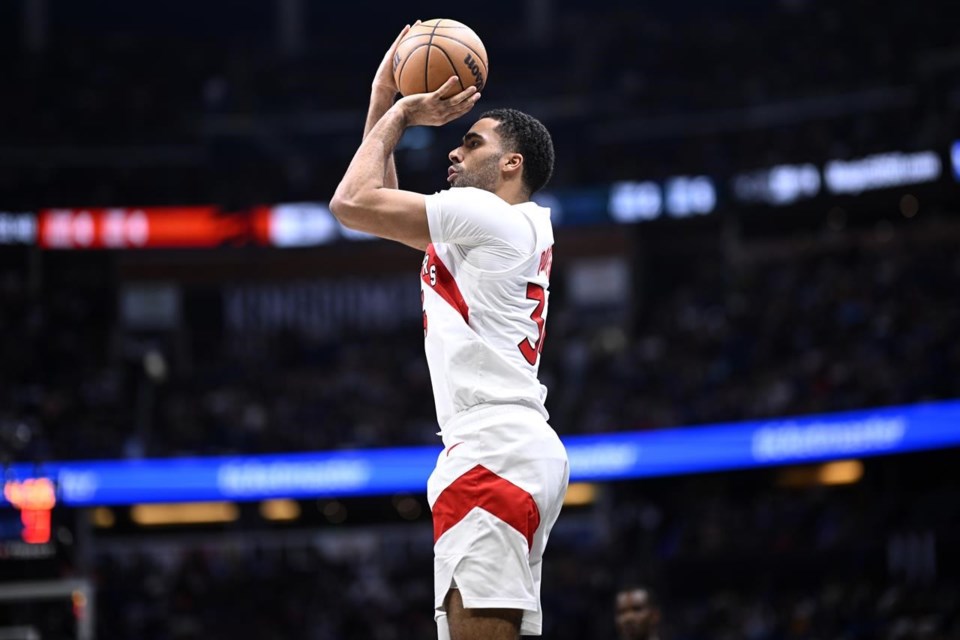Canada's sports integrity watchdog is pushing for stronger policies to prevent competitive manipulation and match-fixing at all levels of competition.
The Canadian Centre for Ethics in Sport issued its first draft of a new program to prevent competition manipulation on Wednesday, the same day that the NBA banned former Toronto Raptors backup centre Jontay Porter for his role in betting irregularities around his on-court performance. Jeremy Luke, the CEO of the sport integrity body, said he hopes Porter's case is a wake-up call to Canadians.
"People are becoming more aware of this risk, or at least aware of this risk now," said Luke on Thursday. "It's really important that we put in place mechanisms to prevent, or at least to mitigate, the risk as much as we possibly can."
The NBA found that Porter violated its rules by disclosing confidential information to sports bettors, limiting his own participation in one or more games for betting purposes, and betting on league games. Luke said that Porter's strong punishment wasn't surprising.
"I thought (the NBA) needed to take significant action in this particular case, but I wasn't also surprised with the situation itself," said Luke. "The legalization of single event sport betting and the proliferation of advertising certainly increases the risk for competition manipulation."
The CCES held symposiums on the dangers of competition manipulation and match-fixing in 2019 and 2023, issuing white papers after each one that called for stronger federal policies around sports betting. The 2019 report was issued before Canada legalized sports betting and the 2023 file built on those original findings.
The Canadian Program to Prevent Competition Manipulation draft issued this week was co-authored by CCES and the Canadian Olympic Committee, with a working group that included national sports organizations for badminton, basketball, cross-country skiing, curling, hockey, racquetball, soccer, speedskating and squash, as well as Sports Canada and AthletesCAN.
The proposed national policy includes comprehensive educational programming targeted at athletes, coaches, and other participants. If adopted, it would empower CCES to administer the policy on behalf of any sport organizations that sign on.
"That's similar to the way that anti-doping works in Canada, where you have one organization (CCES) that's independent from sport that administers the policy on behalf of sport," said Luke. "That way you can have confidence that the organization has the necessary authority and can move forward with the disciplinary proceedings that might be necessary,."
According to NBA investigators, among other infractions, Porter feigned illness to pull himself out of a Raptors game in Toronto to affect bets placed on his performance.
The Alcohol and Gaming Commission of Ontario, which oversees sports betting in the province, said that an Ontario Provincial Police bureau embedded within that agency was investigating the Porter case. An AGCO spokesman cited Section 209 of the Criminal Code of Canada, which prohibits "cheating while playing a game or betting with intent to defraud someone."
The CCES and other experts on competition manipulation say that Section 209 is not robust enough.
The CCES's white papers and draft policy call on Canada to sign The Council of Europe Convention on the Manipulation of Sports Competitions, better known as the Macolin Convention after the Swiss city where it was written. That multilateral treaty aims to prevent, detect, and punish match-fixing in sport and is open to all countries — Australia, as an example, is a non-European signatory — and requires all members of the convention to have clearly articulated laws about competition manipulation.
"Having law enforcement involved in these situations is quite helpful from the perspective of sharing of information, from the perspective of potentially organized crime being involved in this type of activity," said Luke. "Given the volume of money that is being wagered on sport, which can attract that type of situation, and given the serious safety issues that could result from that, making sure that we have laws that can deal with this and making sure that we have a framework in place where betting operators and regulators can report things, and the police can take action or law enforcement can take action effectively on it, I think is important."
— With files from Allison Jones in Toronto.
This report by The Canadian Press was first published April 18, 2024.
John Chidley-Hill, The Canadian Press




